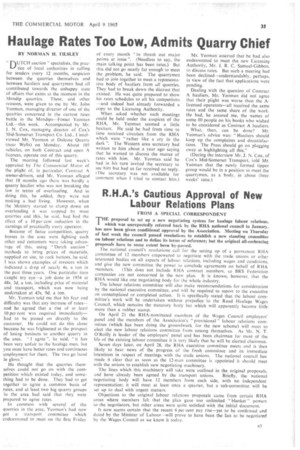R.H.A.'s Cautious Approval of New Labour Relations Plans
Page 37

If you've noticed an error in this article please click here to report it so we can fix it.
FROM A SPECIAL CORRESPONDENT -1-1HE proposal to set up a new negotiating system for haulage labour relations. I which was unexpectedly referred back by the RHA national council in January, has now been given conditional approval by the Association. Meeting on Thursday of last week the council passed resolutions to establish a new standing committee on labour relations and to define its terms of reference; but the original all-embracing proposals have to some extent been by-passed.
The national council's resolutions call for the setting up of a permanent RHA committee of 12 members empowered to negotiate with the trade unions or other interested bodies on all aspects of labour relations, including wages and conditions, and give the new committee the power to conclude agreements on behalf of RHA members. (This does not include RHA contract members, so BRS Federation companies are not concerned in the new plan. It is known, however, that the RHA would like one negotiating body for the whole industry.
The labour relations committee will also make recommendations for consideration by the national executive committee, and will be required to report to the executive on contemplated or completed action. It is specifically stated that the labour committee's work will be undertaken without prejudice to the Road Haulage Wages Council, which remains the statutory body but which will apparently become little more than a rubber stamp.
On April 21 the RHA-nominated members of the Wages Council employers' panel and the members of the Association's " provisional " labour relations committee (which has been doing the groundwork for the new scheme) will meet to elect the new labour relations committee from among themselves. As Mr. N. T. O'Reilly is leader of the employers' panel and has been chairman for most of the life of the existing labour committee it is very likely that he will he elected chairman.
Seven days later, on April 28, the RHA executive committee meets and is then likely to hear news of the progress of the fresh committee and its immediate intentions in respect of meetings with the trade unions, The national council has made it clear that as soon as the 12-man committee is appointed it should meet with the unions to establish new negotiating machinery.
The lines which this machinery will take were outlined in the original proposals.
and have -already been agreed by the transport unions. Briefly, the national negotiating body will have 12 members from each side, with no independent representation; it will meet at least once a quarter, but a sub-committee will be set up to deal with urgent matters.
Objections to the original labour relations proposals came from certain RHA areas where members felt that the plan gave too unlimited "blanket" powers to the negotiators, but other areas were quite satisfied with the initial document.
It now seems certain that the recent 6 per cent pay rise—yet to be confirmed and dated by the Minister of Labour—will prove to have been the last to be negotiated by the Wages Council as we know it today.




































































































































